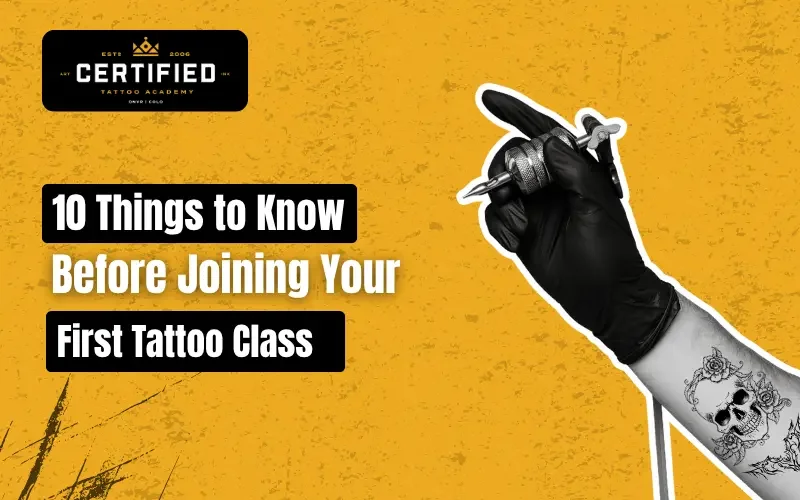10 Things to Know Before Joining Your First Tattoo Class
Thinking of Starting Your Tattoo Journey?
Joining your first tattoo class is exciting. It’s the step where passion begins to turn into a profession. But before you walk into the studio or log into your online tattoo training, there are a few things you should know to make the most of the experience.
At Certified Tattoo Academy, we guide beginners through every stage, from understanding the basics to preparing for real client work. Here are ten things every aspiring artist should keep in mind before starting their first class.
Tattooing Is More Than Just Art
You’ll need drawing skills, but tattooing also demands precision, patience, and discipline. Tattoo classes focus on technique, safety, and client experience, not just creativity.
Hygiene Comes First
Sterilization, equipment cleaning, and cross-contamination prevention are essential. A strong tattoo course teaches these skills early because your reputation as an artist depends on safe practices.
Read our guide: How to Clean Tattoo Equipment
Invest in the Right Tools
Your class may provide a starter kit, but learning how to select machines, needles, and inks is part of the process. Choosing between a rotary vs coil tattoo machine will likely come up in training.
Skin Is Not Paper
Tattooing human skin feels nothing like drawing on paper. Your first classes often use practice skins so you can understand needle depth, speed, and control without pressure.
Apprenticeship Still Matters
Online courses are a great start, but hands-on experience under a mentor remains valuable. That’s why we combine tattoo apprenticeship opportunities with structured online learning.
Learn Different Styles Early
Fine line, realism, traditional, and tiny tattoos each require different techniques. A class that introduces multiple styles, like our tiny tattoo course, helps you figure out what excites you most.
Mistakes Are Part of Learning
Your first tattoos on practice skin (or even fruit) may look rough. That’s normal. Good training emphasizes correction, technique refinement, and consistency over perfection on day one.
Client Communication Is a Skill
A great tattooer knows how to talk to clients, explaining pain levels, aftercare, and design adjustments. Expect your class to cover professionalism as much as technical skills.
Tattooing Is a Business
Whether you want to work in a studio or go independent, knowing about pricing, scheduling, and branding matters. Look for a class that includes the business side of tattooing.
Growth Doesn’t Stop After the Course
Tattoo education isn’t one-and-done. The best artists keep training, upgrading techniques, and learning from peers. With options like our tattoo courses and mentorship programs, you’ll never run out of ways to grow.
Final Thoughts
Starting your first tattoo class is exciting, but being prepared helps you succeed faster. Understand the craft, stay open to feedback, and remember that tattooing is as much about dedication as it is about art.
If you’re ready to begin, check out our tattoo training programs designed for beginners who want a structured, professional start.

Frequently Asked Questions
-
Most beginners spend 6–12 months building core skills through classes and apprenticeships. Mastery takes years of practice and continued education.
-
No, but basic drawing skills help. A good tattoo course teaches both technical and artistic development, so you can start with any skill level.
-
Many academies provide starter kits, but it’s helpful to bring your sketchbook, reference drawings, and a willingness to practice consistently.
-
Online training gives you strong foundations in safety, technique, and business. To go pro, most artists also complete an apprenticeship for hands-on experience.
-
If you love art, have patience, and want a career that blends creativity with technical skill, tattooing could be a great fit. Trial classes and practice skins are a good way to test your interest.

